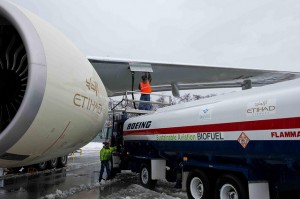Boeing and Commercial Aircraft Corporation of China (COMAC) have opened a demonstration facility that will turn waste cooking oil, known as “gutter oil” in China, into sustainable aviation fuel.

The opening of the demonstration facility builds on the collaboration between Boeing and COMAC which was established in 2012 with the opening of Boeing-COMAC Aviation Energy Conservation and Emissions Reductions Technology Centre in Beijing, which works with Chinese universities and research institutions to expand knowledge in areas that improve aviation’s efficiency, such as aviation biofuel and air traffic management.
According to the press release by Boeing, the new demonstration facility – which is called the China – U.S. Aviation Biofuel Pilot Project – will produce up to 500 million gallons of biofuel per year using a technology developed by Hangzhou Energy & Engineering Technology Co., Ltd. (HEET), which cleans contaminants from waste oils and converts it into jet fuel at a rate of 170 gallons (650 litters) per day.
“Strong and continuing teamwork between Boeing and COMAC is helping our industry make progress on environmental challenges that no single company or country can solve alone. By working together for mutual benefit, we’re finding innovative ways to support China’s aviation industry and build a sustainable future,” said Ian Thomas, President, Boeing China.
“We are very happy to see the progress that has been made in the collaboration between Boeing and COMAC, especially the achievement in aviation biofuel technology. We will continue to work with Boeing in energy conservation and emissions reduction areas to promote the sustainable development of the aviation industry,” said Dr Guangqiu Wang, Vice President of COMAC’s Beijing Aeronautical Science & Technology Research Institute.
Sustainably produced biofuel, which reduces carbon emissions by 50 to 80% compared to petroleum through its lifecycle, is expected to play a key role in supporting aviation’s growth while meeting environmental goals. The Boeing Current Market Outlook has forecast that China will require more than 6,000 new airplanes by 2033 to meet fast-growing passenger demand for domestic and international air travel.
Biofuel produced by the China – U.S. Aviation Biofuel Pilot Project will meet international specifications approved in 2011 for jet fuel made from plant oils and animal fats. This type of biofuel has already been used for more than 1,600 commercial flights.




















